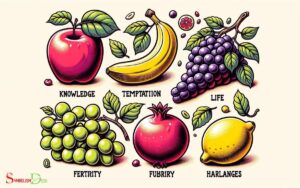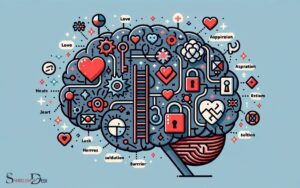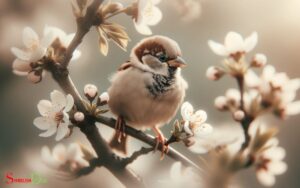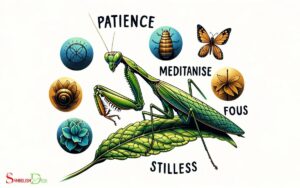What is the Symbolic Meaning of a Rooster? Vigilance!
The rooster symbolizes courage, vigilance, and resurrection across various cultures. Its image is often used to represent the start of a new day, fertility, and the warding off of evil spirits.
The symbolic meaning of a rooster varies globally, but common themes include:
- Courage and Bravery: Often associated with the rooster’s bold and aggressive nature.
- Vigilance: The rooster’s early morning crowing signifies alertness and readiness.
- Resurrection: In Christianity, the rooster is a sign of Christ’s resurrection, as it heralds the dawn of a new day.
- Fertility: In some cultures, the rooster is a phallic symbol representing potency and procreation.
- Protection: The rooster’s crow is believed to ward off evil spirits in folklore.
Examples include the rooster weathervane, which is a symbol of vigilance, and the Chinese zodiac, where the rooster is one of the 12 signs, symbolizing honesty, intelligence, and confidence.
The rooster’s crow at dawn breaks the silence, symbolizing the triumph of light over darkness and a call to awaken to new possibilities.
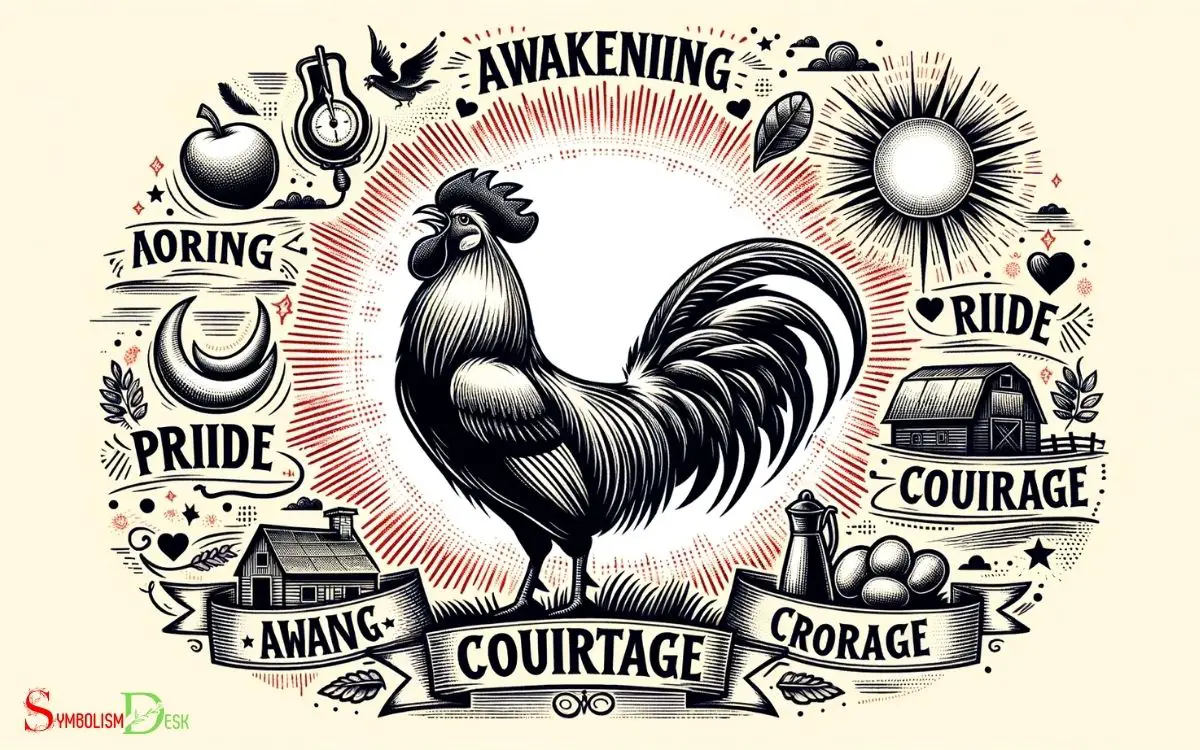
Key Takeaway
8 Cultures: Symbolic Meanings of a Rooster
| Culture/Religion | Symbolic Meaning of a Rooster |
|---|---|
| Christianity | It symbolizes the awakening, resurrection, and redemption. The rooster announces the dawn, it’s a symbol of Christ who brings light after darkness. |
| Chinese Culture | The rooster is one of the 12 Chinese zodiac animals, representing fidelity and punctuality because it wakes people up on time. |
| Celtic Culture | Roosters are considered as symbols of honesty, strength, and bravery, often associated with the sun and its healing powers. |
| Japanese Culture | The rooster is believed to ward off evil spirits due to its crowing at dawn, a time when evil spirits are said to be most potent. |
| Greek Mythology | The rooster is associated with the god Apollo and symbolizes the victory of light over darkness and good over evil. |
| Buddhism | Roosters are thought to embody lust, pride, and gluttony, and are often depicted as one of the three poisons in Buddhist iconography. |
| Native American Culture | Roosters are seen as symbols of dawn, protection, and watchfulness. |
| France | The rooster is a national symbol of France, representing the hope and faith of the nation. |
Historical and Cultural Significance
The rooster has held significant historical and cultural importance in many societies around the world.
Dating back to ancient civilizations, the rooster has been revered as a symbol of power, courage, and vigilance.
In Chinese culture, the rooster is one of the twelve zodiac animals and is believed to bring good fortune and protection from evil spirits.
In Christianity, the rooster holds symbolic significance due to its association with the apostle Peter’s denial of Jesus.
Additionally, in countries such as France and Portugal, the rooster is a national symbol, representing heroism and strength.
Its crowing at dawn has also been linked to the concept of new beginnings and the triumph of light over darkness.
Across various cultures, the rooster’s historical and cultural significance continues to be deeply ingrained in traditions and beliefs.
Rooster Symbolism in Different Cultures
Rooster symbolism holds distinct meanings across various cultures, reflecting its enduring significance worldwide.
In Chinese culture, the rooster is associated with fidelity and punctuality, symbolizing good fortune and fidelity in relationships.
In Celtic traditions, the rooster is linked to the sun and is seen as a solar symbol representing strength, fertility, and protection.
In Hinduism, the rooster is connected to the goddess Bhadrakali and is a symbol of the victory of light over darkness.
Additionally, in French folklore, the rooster is a national symbol representing vigilance and is associated with the Gallic tribe.
These diverse cultural interpretations of the rooster demonstrate its pervasive symbolic importance and the multifaceted nature of its representation across the world.
Rooster as a Symbol of Bravery
In different cultures, the rooster’s symbolic representation of bravery is often linked to its association with the sun and its role as a herald of the morning.
The rooster’s ability to announce the start of a new day has been interpreted as a courageous act, symbolizing the bravery to face the unknown and to boldly confront challenges.
In many societies, the rooster’s crowing is seen as a proclamation of fearlessness, resilience, and strength. This symbolism is often reflected in various cultural practices and beliefs, where the rooster is revered as a symbol of protection and courage.
In Chinese culture, for example, the rooster is associated with the concept of yang, representing masculine energy, heroism, and fearlessness. Similarly, in other cultures, the rooster’s bold and assertive nature has contributed to its symbolic association with bravery.
Rooster as a Symbol of Good Fortune
Associated with prosperity and luck, the rooster’s symbolism as a harbinger of good fortune extends beyond its representation of bravery.
In many cultures, the rooster is considered a symbol of good luck and is believed to bring positive energy and prosperity to those it encounters.
This belief is rooted in various cultural and religious traditions, where the rooster is seen as a bringer of good tidings and a protector against negative forces.
The rooster’s crowing at dawn is also associated with awakening and renewal, further reinforcing its association with good fortune.
Additionally, in feng shui, the rooster is often used to attract good luck and prosperity, making it a popular symbol in homes and businesses seeking positive energy.
Are the Symbolic Meanings of Different Animals Related to Their Traits or Behaviors?
Many believe that the symbolic meaning of donkey is closely related to its traits and behaviors. In various cultures, the donkey symbolizes patience, persistence, and determination due to its hardworking nature. This symbolism reflects the donkey’s actual characteristics as a resilient and diligent animal.
Rooster Symbolism in Art and Literature
Symbolized in various art forms and literary works, the rooster’s significance as a harbinger of good fortune continues to be celebrated across cultures and traditions.
In art and literature, the rooster is often depicted to convey a range of symbolic meanings, including courage, vigilance, and the arrival of a new day. In many cultures, the rooster is also seen as a symbol of fertility and good luck. Understanding feather symbolism is also important in interpreting the significance of the rooster, as its brightly colored feathers are often associated with vitality and power. In literature, the rooster is often used to represent hope and optimism, as its crowing is thought to announce a new beginning and the breaking of dawn.
Here are some notable examples of rooster symbolism in art and literature:
| Art/Literature | Rooster Symbolism |
|---|---|
| Greek Mythology | The rooster is associated with the sun and is considered a symbol of light and renewal. |
| Chinese Art | In Chinese art, the rooster is a symbol of fidelity and punctuality, often associated with the god of honesty and justice. |
| Chaucer’s ‘The Canterbury Tales’ | Chanticleer, the rooster in this literary work, symbolizes vanity and the unpredictability of life. |
Through these examples, it’s evident that the rooster holds a diverse and enduring symbolism in art and literature, enriching cultural narratives and artistic expressions.
Conclusion
The rooster holds significant symbolic meaning across different cultures. It represents bravery, good fortune, and a powerful presence. Its historical and cultural significance has made it a popular subject in art and literature.
The rooster captures the imagination of people around the world. Whether it’s crowing at dawn or standing tall in a painting, the rooster continues to symbolize strength and positivity. This makes it a timeless and fascinating symbol to explore.


